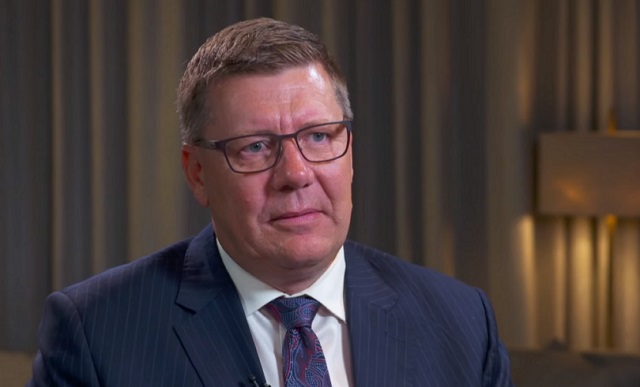Alberta
Alberta backs Saskatchewan in court battle defending parental consent for ‘pronoun changes’

From LifeSiteNews
‘Saskatchewan and Alberta agree that the key figures in children’s lives are their parents, and our provinces are both committed to supporting families and children so that they can work through unique needs together,’ the provinces wrote in a joint letter in defense of parental rights.
Alberta has announced its support of Saskatchewan’s policy requiring parental consent for children to go by different pronouns at school amid a lawsuit against the policy by an LGBT activist group.
On April 9, Alberta Minister of Justice and Attorney General Mickey Amery and Saskatchewan Minister of Justice and Attorney General Bronwyn Eyre revealed that Alberta will intervene in Saskatchewan’s Parents’ Bill of Rights case challenging their new pro-family laws.
“Saskatchewan and Alberta agree that the key figures in children’s lives are their parents, and our provinces are both committed to supporting families and children so that they can work through unique needs together,” the joint statement read.
“Notifying parents and requiring their consent before a child’s name or pronouns can be changed in schools, and before classroom discussions about gender identity and other sensitive subjects occur, ensures that the parent-child relationship is respected and paramount,” it continued.
The pronoun policy is just one part of Saskatchewan’s new “Parental Inclusion and Consent Policies,” which also include provisions that ensure parents are allowed to opt their kids out of sex-ed, and that third-party presentations from groups such as Planned Parenthood will be prohibited from taking place.
After the policies were put forth, LGBT activist group UR Pride Centre for Sexuality and Gender Diversity at the University of Regina, represented by Egale Canada, filed a lawsuit to reverse the pro-family laws.
While a judge has ruled in favor of the LGBT group, Saskatchewan Premier Scott Moe announced in response that he will invoke his government’s notwithstanding clause to protect the legislation from the courts.
The notwithstanding clause, embedded in section 33 of the Canadian Charter of Rights and Freedoms, allows provinces to temporarily override sections of the Charter to protect new laws from being scrapped while higher courts make a determination on the constitutionality of the law.
The case is set to be heard in the Saskatchewan Court of Appeal. During the case, Saskatchewan will now be supported by Alberta, which has committed to intervene in the appeal.
“Alberta will seek to advance legal arguments that Saskatchewan’s use of section 33 of the Charter (the Parliamentary Supremacy Clause) should have prevented Saskatchewan’s Court of King’s Bench from reviewing the constitutionality of the Education (Parent’s Bill of Rights) Amendment Act, 2023 legislation,” the province promised.
“This case has the potential to impact not only parental rights across Canada, but also the application of the Parliamentary Supremacy Clause, which has been an integral piece of the Canadian Charter of Rights and Freedoms and the Constitution of Canada since 1982,” it declared.
Similar to Saskatchewan, Alberta recently introduced its much-anticipated pro-family legislation protecting children and parental rights from the worst results of transgender ideology, including banning doctors from medically ‘transitioning’ children, requiring parental consent for pronoun changes in school, and barring men claiming to be women from women’s sports.
Recent surveys have shown that Moe is acting in the interest of Saskatchewan parents by introducing legislation protecting school children from LGBT propaganda.
According to an August 2023 survey, 86 percent of Saskatchewan participants advocated for parental rights, supporting the province’s new approach to the LGBT agenda in schools.
Furthermore, over 40,000 Canadians have pledged their support for Saskatchewan’s fight for parental rights in the classroom, also calling on all other provinces to follow suit.
Additionally, a Saskatchewan teacher wishing to remain anonymous previously told LifeSiteNews that she feels guilty about keeping secrets from parents and supports the decision to keep parents informed.
“I fear that we are not supporting students or parents when we keep secrets,” she explained. “We have many students using alternate names, which sometimes changes frequently during the year, and then are asked by parents if we were aware of the changes after the fact. I feel responsible for keeping the secret and I don’t think it’s fair. I think schools are already taking on too many ‘parent roles’ and it’s important that parents play the ‘parent role’ not teachers!”
Alberta
Canada’s heavy oil finds new fans as global demand rises

From the Canadian Energy Centre
By Will Gibson
“The refining industry wants heavy oil. We are actually in a shortage of heavy oil globally right now, and you can see that in the prices”
Once priced at a steep discount to its lighter, sweeter counterparts, Canadian oil has earned growing admiration—and market share—among new customers in Asia.
Canada’s oil exports are primarily “heavy” oil from the Alberta oil sands, compared to oil from more conventional “light” plays like the Permian Basin in the U.S.
One way to think of it is that heavy oil is thick and does not flow easily, while light oil is thin and flows freely, like fudge compared to apple juice.
“The refining industry wants heavy oil. We are actually in a shortage of heavy oil globally right now, and you can see that in the prices,” said Susan Bell, senior vice-president of downstream research with Rystad Energy.
A narrowing price gap
Alberta’s heavy oil producers generally receive a lower price than light oil producers, partly a result of different crude quality but mainly because of the cost of transportation, according to S&P Global.
The “differential” between Western Canadian Select (WCS) and West Texas Intermediate (WTI) blew out to nearly US$50 per barrel in 2018 because of pipeline bottlenecks, forcing Alberta to step in and cut production.
So far this year, the differential has narrowed to as little as US$10 per barrel, averaging around US$12, according to GLJ Petroleum Consultants.
“The differential between WCS and WTI is the narrowest I’ve seen in three decades working in the industry,” Bell said.
Trans Mountain Expansion opens the door to Asia

Oil tanker docked at the Westridge Marine Terminal in Burnaby, B.C. Photo courtesy Trans Mountain Corporation
The price boost is thanks to the Trans Mountain expansion, which opened a new gateway to Asia in May 2024 by nearly tripling the pipeline’s capacity.
This helps fill the supply void left by other major regions that export heavy oil – Venezuela and Mexico – where production is declining or unsteady.
Canadian oil exports outside the United States reached a record 525,000 barrels per day in July 2025, the latest month of data available from the Canada Energy Regulator.
China leads Asian buyers since the expansion went into service, along with Japan, Brunei and Singapore, Bloomberg reports. 
Asian refineries see opportunity in heavy oil
“What we are seeing now is a lot of refineries in the Asian market have been exposed long enough to WCS and now are comfortable with taking on regular shipments,” Bell said.
Kevin Birn, chief analyst for Canadian oil markets at S&P Global, said rising demand for heavier crude in Asia comes from refineries expanding capacity to process it and capture more value from lower-cost feedstocks.
“They’ve invested in capital improvements on the front end to convert heavier oils into more valuable refined products,” said Birn, who also heads S&P’s Center of Emissions Excellence.
Refiners in the U.S. Gulf Coast and Midwest made similar investments over the past 40 years to capitalize on supply from Latin America and the oil sands, he said.
While oil sands output has grown, supplies from Latin America have declined.
Mexico’s state oil company, Pemex, reports it produced roughly 1.6 million barrels per day in the second quarter of 2025, a steep drop from 2.3 million in 2015 and 2.6 million in 2010.
Meanwhile, Venezuela’s oil production, which was nearly 2.9 million barrels per day in 2010, was just 965,000 barrels per day this September, according to OPEC.
The case for more Canadian pipelines

Worker at an oil sands SAGD processing facility in northern Alberta. Photo courtesy Strathcona Resources
“The growth in heavy demand, and decline of other sources of heavy supply has contributed to a tighter market for heavy oil and narrower spreads,” Birn said.
Even the International Energy Agency, known for its bearish projections of future oil demand, sees rising global use of extra-heavy oil through 2050.
The chief impediments to Canada building new pipelines to meet the demand are political rather than market-based, said both Bell and Birn.
“There is absolutely a business case for a second pipeline to tidewater,” Bell said.
“The challenge is other hurdles limiting the growth in the industry, including legislation such as the tanker ban or the oil and gas emissions cap.”
A strategic choice for Canada
Because Alberta’s oil sands will continue a steady, reliable and low-cost supply of heavy oil into the future, Birn said policymakers and Canadians have options.
“Canada needs to ask itself whether to continue to expand pipeline capacity south to the United States or to access global markets itself, which would bring more competition for its products.”
Alberta
From Underdog to Top Broodmare

WATCH From Underdog to Top Broodmare (video)
Executive Producers Jeff Robillard (Horse Racing Alberta) and Mike Little (Shinelight Entertainment)
What began as an underdog story became a legacy of excellence. Crackers Hot Shot didn’t just race — she paved the way for future generations, and in doing so became one of the most influential producers the province has known.
The extraordinary journey of Crackers Hot Shot — once overlooked, now revered — stands as one of Alberta’s finest success stories in harness racing and breeding.
Born in humble circumstances and initially considered rough around the edges, Crackers Hot Shot overcame long odds to carve out a career that would forever impact the province’s racing industry. From a “wild, unhandled filly” to Alberta’s “Horse of the Year” in 2013, to producing foals who carry her spirit and fortitude into future generations.
Her influence ripples through Alberta’s racing and breeding landscape: from how young stock are prepared, to the aspirations of local breeders who now look to “the mare that did it” as proof that world-class talent can emerge from Alberta’s paddocks.
“Crackers Hot Shot, she had a tough start. She wasn’t much to look at when we first got her” — Rod Starkewski
“Crackers Hot Shot was left on her own – Carl Archibald heard us talking, he said ‘I’ll go get her – I live by there’. I think it took him 3 days to dig her out of the snow. She was completely wild – then we just started working on her. She really needed some humans to work with her – and get to know that people are not scary.” — Jackie Starkewski
“Crackers Hot Shot would be one of the top broodmares in Albeta percentage wise if nothing else. Her foals hit the track – they’re looking for the winners circle every time.” — Connie Kolthammer
Visit thehorses.com to learn more about Alberta’s Horse Racing industry.
-

 Business2 days ago
Business2 days agoTrans Mountain executive says it’s time to fix the system, expand access, and think like a nation builder
-

 International1 day ago
International1 day agoBiden’s Autopen Orders declared “null and void”
-

 MAiD1 day ago
MAiD1 day agoStudy promotes liver transplants from Canadian euthanasia victims
-

 Business1 day ago
Business1 day agoCanada has given $109 million to Communist China for ‘sustainable development’ since 2015
-

 Internet2 days ago
Internet2 days agoMusk launches Grokipedia to break Wikipedia’s information monopoly
-

 Business2 days ago
Business2 days agoCanada’s combative trade tactics are backfiring
-

 Business1 day ago
Business1 day agoYou Won’t Believe What Canada’s Embassy in Brazil Has Been Up To
-

 Automotive1 day ago
Automotive1 day agoCarney’s Budget Risks Another Costly EV Bet






